Advertisement
If your pool has been losing water either quickly or over time, you may be interested in pool leak detection. Pools lose water for natural reasons. These include backwashing your filter, evaporation and water lost while splashing. However, if your pool is losing more water than it normally does you may be wondering how to find a leak in a pool?
Usually, if you are losing more than 2 inches of water a week, you might have a pool leak. If you want to call a professional company to fix your pool leak repair, why not try these few home tips first? This way you will be able to determine whether you can fix your leak yourself.
Pool leak detection
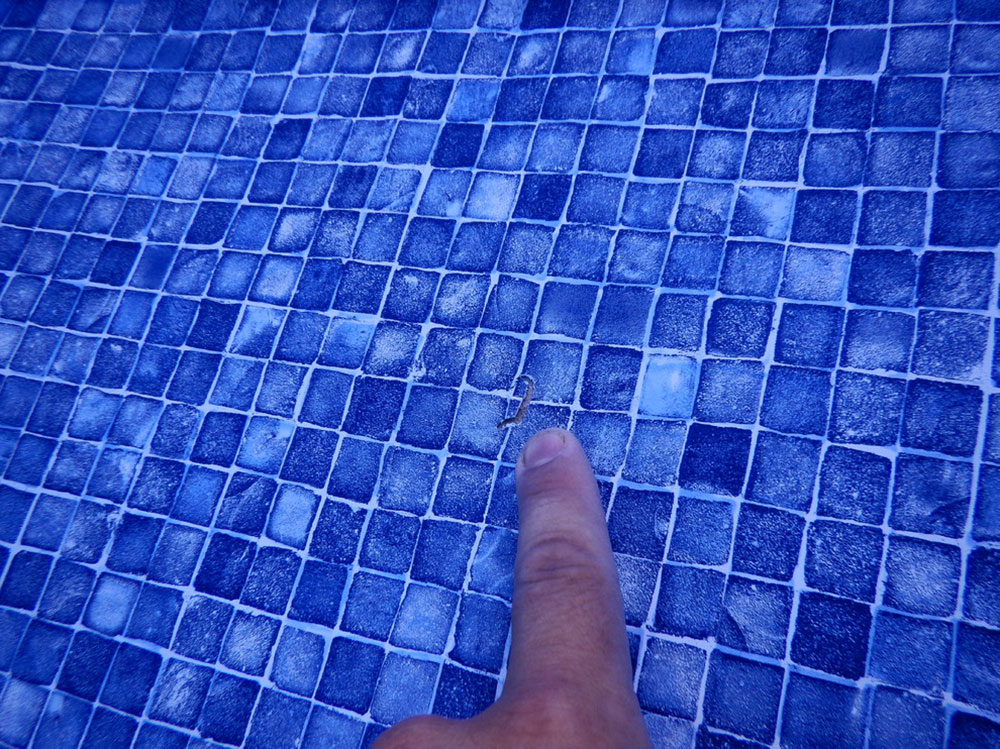 Image source: Pool Buoy Corp Leak Detection
Image source: Pool Buoy Corp Leak Detection
Here are some signs that you may have a spa or pool leak:
- Persistent problems with water quality, algae growth and chemical imbalance. This is because a leak (and the need to constantly refill your pool) makes it impossible to maintain a constant pool balance.
- Loose tiles or cracks in your pool or surrounding areas which would allow water to seep out.
- Tree roots which are beginning to lift your pool deck may also infringe on your pool walls or plumbing.
- Cracks around your bond beam (or the top portion of the pool) may indicate a pool leak.
- Damp or saturated grass around your pool or filter.
- Your pool deck is sinking or warping.
- You are constantly refilling your pool every week because your water levels are dropping.
- Your pool is losing over ¼ of an inch of water every day.
Methods of swimming pool leak detection
 Image source: J. Brandon Jones
Image source: J. Brandon Jones
This is a pool leak detection test which will help you to determine normal levels of evaporation. Place a bucket of water near your pool. Mark off the levels of water in your bucket and then the levels in your pool. Leave your bucket to stand for a few days and then measure the difference between your pool and your bucket.
If your water levels have decreased at the same rate in your pool and bucket, you don’t have a leak. If you find your pool loosing water at a faster rate than your bucket, you have a water leak. If your pool loses water at the same level as your bucket, you probably don’t have a leak.
The dye test
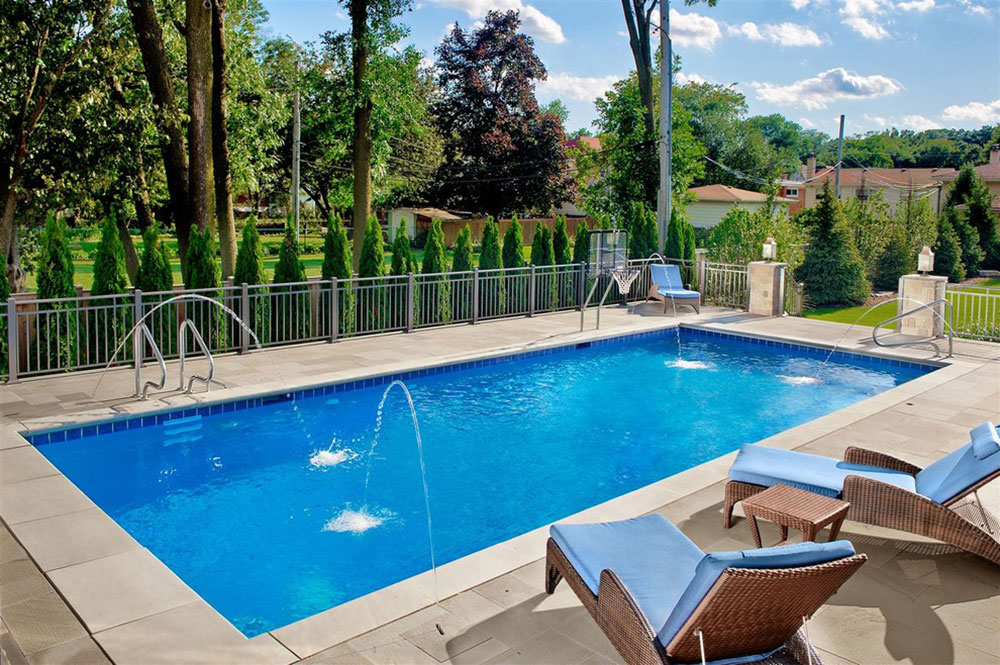 Image source: Platinum Poolcare
Image source: Platinum Poolcare
The dye test is a means of swimming pool leak detection which uses dye to find a pool leak.
Prepare: begin by brushing down your pool, focusing on your steps, corners and fittings. It helps to work on a calm day as wind which ripples the surface of your pool makes it hard to detect cracks. If you need to increase your visibility then it helps to squirt tile soap on the surface of the water.
Inspect: now it’s time to search for cracks, loose tiles and hollow tiles. Tap your tiles gently to see if they sound hollow or feel loose.
Dye: squirt dye around areas where you suspect there is a pool leak. If the dye is absorbed into the tile or cracked surface, you have a leak. If the swimming pool leak detection dye circulates in the water but doesn’t get sucked in, you don’t have a leak.
Observe: continue to monitor other areas of your pool like your fittings, filtration system, plumbing and lights.
Time to call in the professionals
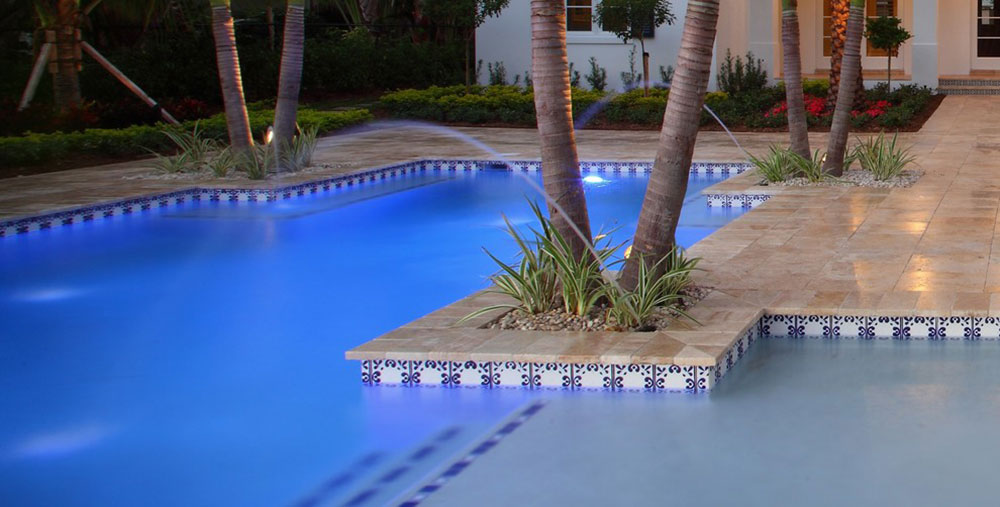 Image source: Rustic Brick and Fireplace
Image source: Rustic Brick and Fireplace
If you have a pool losing water but haven’t been able to detect the leak it may be time to call in the professionals. There are two more methods of pool leak detection that you could use but unless you own a geophone or understand how to use pressure testing equipment, professional support may be the best answer.
Using a geophone: a geophone is an electronic device which is able to pick up the sound of leaks or drips. The operator of a geophone is able to pick up where water is leaking from your pool or circulation system. You will need to know how to use a geophone before you will be able to detect a water leak.
Using pressure testing equipment: you’ll need to know how to use pressure testing equipment to detect a pool leak. This will help you to determine whether the leak is situated in your pool body or in your water pipes. You will also be able to determine the location of the leak. However, unless you have experience with pressure testing it is better to call in the professionals.
Locating the leak
Check what is obvious first
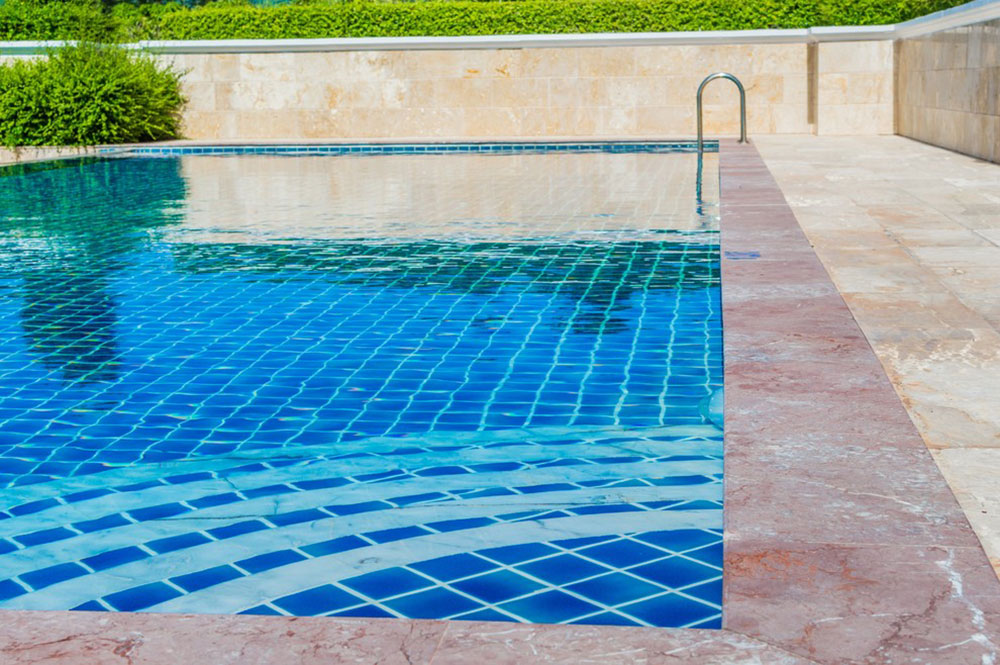 Image source: JES Foundation Repair
Image source: JES Foundation Repair
Here are some clues to show you where to find your leak:
- Look at your filtration system, heater and pool pumps. Do you detect any wet patches?
- Do you see any water or saturated spaces around your pool? Any sunken areas or rivers of erosion?
- If you need an above the ground leak detector, begin by checking for tears in your vinyl, steps, corners, lights and finally pool skimmer leaks.
Check for a leak in the circulation and electrical system of your pool
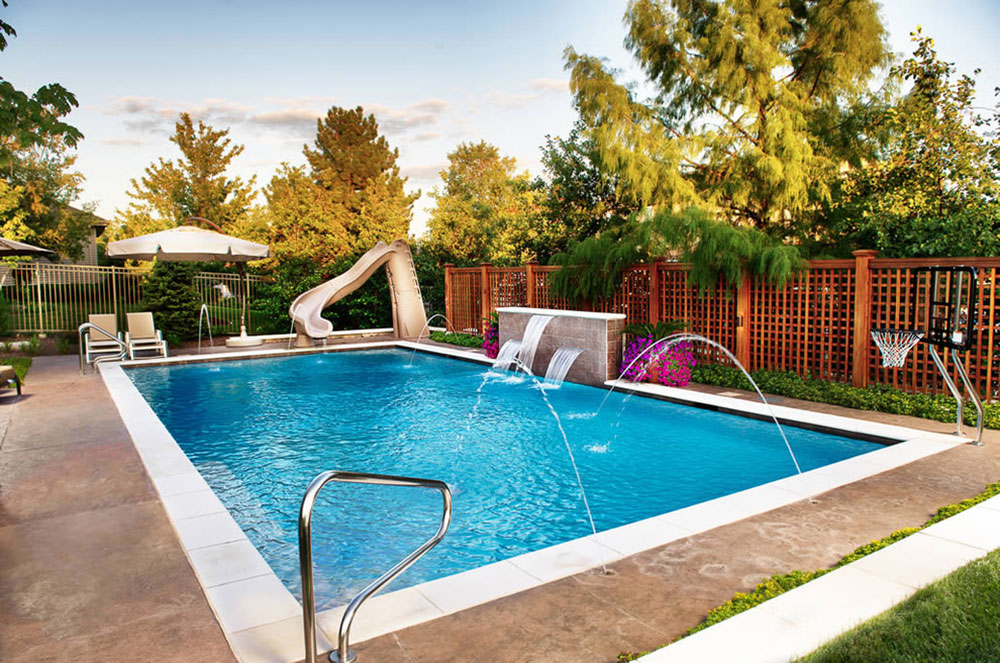 Image source: Platinum Poolcare
Image source: Platinum Poolcare
- Searching for leaks in the electrical or plumbing system of your pool is relatively easy. All you have to do is look at the conduit pipes that extend from the pool’s lighting system. These wires should not have any water upon them. If you find a swimming pool leak along your electric conduit lines, call a professional. Wet electrical wires could give you a nasty shock.
- If you are carrying out pool leak detection with your water system, remember to turn off the filtration. Next, look at your pipes, fittings or pump. You will be trying to find moisture. If you do find moisture this is likely to be where your pool leak comes from. If it is a simple pipe leak you may be able to fix it yourself. If the problem is more complex, like a leaking pump, it would be best to call in a professional.
How to find a leak in pool liners using food coloring
If you have checked your circulation system as well as your electrics and you haven’t found a leak, it is time to check your pool liner. If you have a vinyl liner, you can carry out swimming pool leak detection by using food colouring.
Follow these steps on how to find leaks in pool liners:
- Fill up your pool as far as you can so that a low water level does not prevent you from detecting a leak in your pool.
- Check the floor of your pool. If it has a spongy texture then the leak is most likely at the bottom of your pool.
- Check your pool lining. If you believe you have found a leak, place a few drops of colouring in this area.
- Continue doing so until you find the area of your vinyl lining which is leaking.
- It is easy to detect a pool liner leak with dye. If the dye moves out of the pool, it will be following the flow of water through the leak. If it remains in the pool, there is no leak.
If you want to confirm swimming pool leaks, here are a couple of techniques to try out
 Image source: Creative Environments
Image source: Creative Environments
Do you believe you have a swimming pool leak? Here are a couple of ways to confirm this:
- Check the amount of water you are losing from your pool each day by marking the water level of your pool. Mark the level at your skimmer box using tape or a waterproof pencil. Leave your mark for 24 hours and then check your water levels again. If you are losing more than ¼ an inch of water per day your pool most likely has a leak.
- You can use the bucket test as indicated above to detect a pool leak. Remember that you can also place your bucket on the step of your pool, anchoring it down with a rock. The levels of water inside and outside of your bucket should correspond after 24 hours.
Some quick tips to find a hole in a pool
 Image source: THE POOL ARTIST Brian T Stratton
Image source: THE POOL ARTIST Brian T Stratton
When you notice that your pool is losing water, your water levels may enable you to detect your swimming pool leak. Remember though that a vinyl pool liner needs to be filled with water at all times. If your water levels drop quickly refill your pool and call a professional.
- If your water level settles beneath your skimmer box, it may be your pool skimmer leaking water. Alternatively it may be time to check your pool’s filtration system.
- Check to see if there are bubbles in your water jets or pool return line. If so, your filtration system has a leak in the suction side of the filtration system.
- Check that your pool basket’s lid is tight, lubricated and in good condition.
- If water carries on draining and ends at the light, then the leak is probably in the housing of the light.
- If the water is lower than your pool light, there may be a leak in the bottom drain of the pool.
- Focus on your filtration system. If you are losing water while your pool pump is on, the leak is on the return side of the filter system. Check your waste line.
- Look for cracks, gaps and tears in your skimmer, light or liner depending on where you have located your leak.
- Turn your pool pump off and place some dye into your pool water. See if the dye is sucked into your filtration system with the pump turned off. If so, your swimming pool leak detection has been accurate.
Fixing the leak
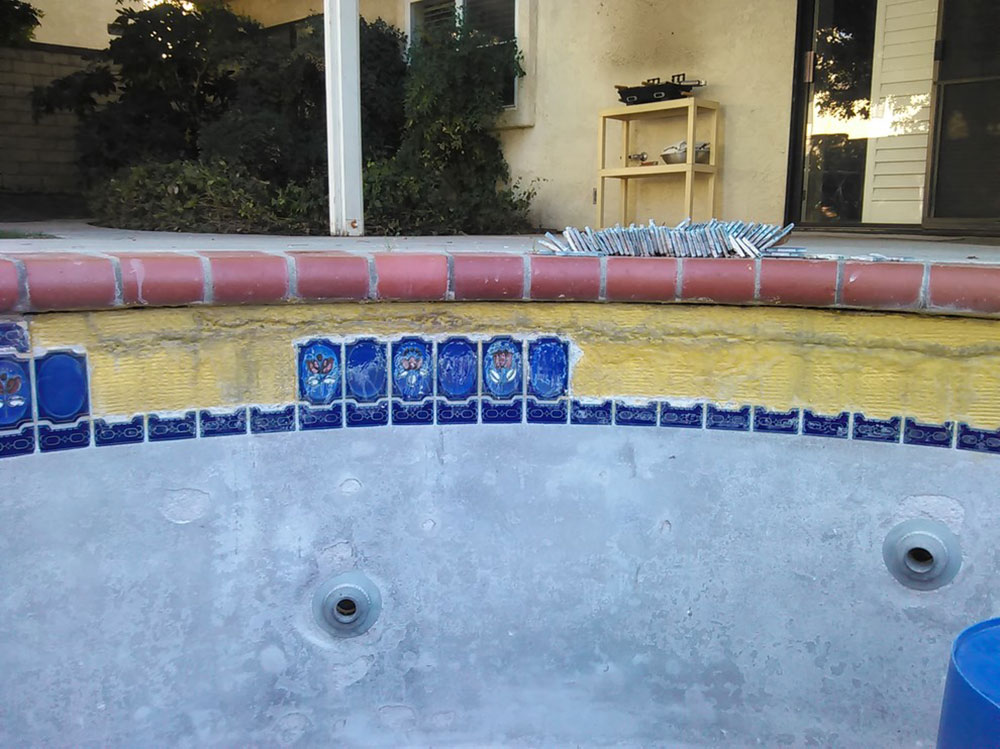 Image source: Lees Home Services
Image source: Lees Home Services
Now that you have located the leak in your pool, it is time to see if you can fix your leak. Where your leak is located will determine the treatment.
- Skimmer leaks: are often found in the space between skimmer box and pool. You can fix a skimmer leak with pool putty.
- Light leaks: if you have a light leak, it may mean a break in the conduit pipe. This is not easy to patch. Use a two part epoxy with silicone, caulk or putty.
- Linear leaks can be patched with a pool liner leak repair kit. An underwater patch kit can be used for leaks in wet areas.
What if you haven’t been able to find a leak?
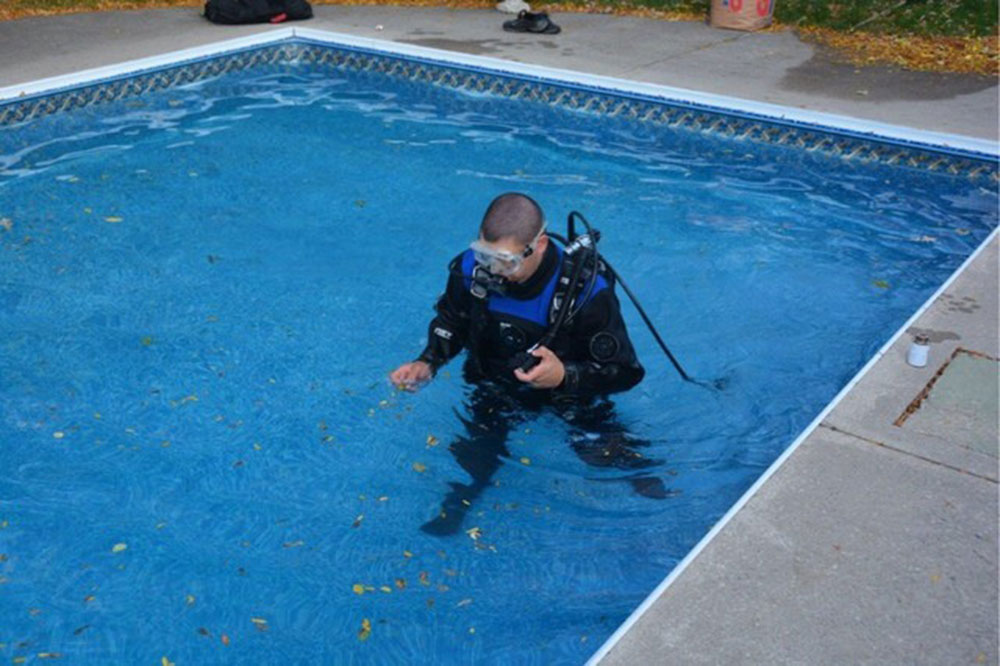 Image source: Pool Buoy Corp Leak Detection
Image source: Pool Buoy Corp Leak Detection
If you haven’t been able to detect your swimming pool leak, call in a professional. A professional will use up to date technology to assist you without any hassle or fuss.
Many professionals use a pressure test. A pressure test uses compressed air. This air moves through a pipe until it reaches a leak. At this point, bubbles will escape from your pipes to reveal the site of a leak. Some may use cameras to spot leaks in plumbing pipes. Others may place air in your pool pipes and then listen to where this air is escaping from.
Professional pool leak detection comes with a price. You will often pay between $150 and $1250 to detect a swimming pool leak. Price will depend on where you live and how complex it is to determine where your leak is coming from.
When you understand basic plumbing you will be able to imagine possible repairs
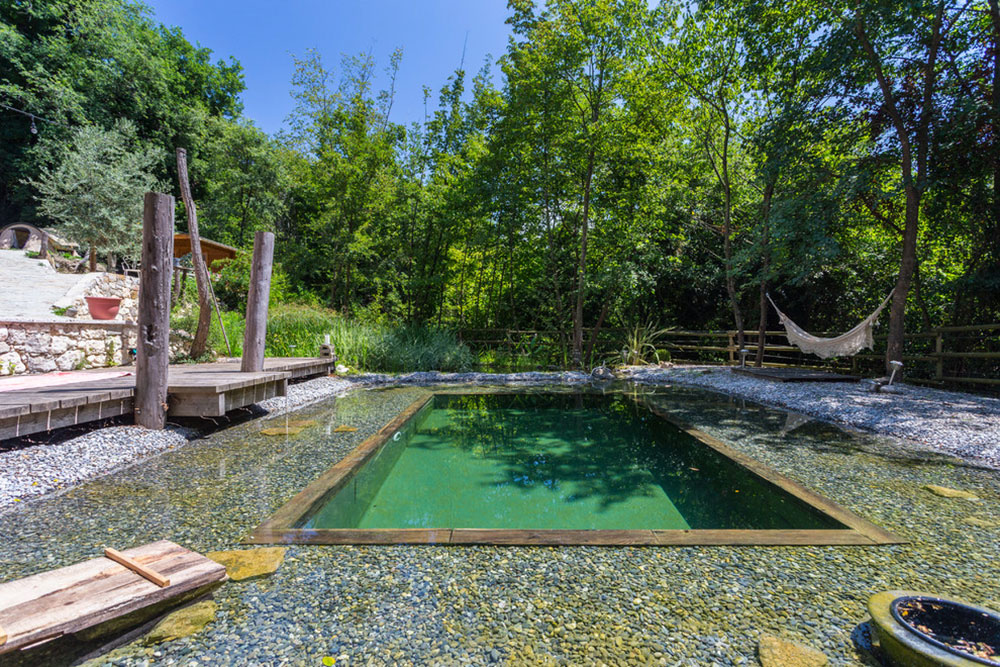
Image source: Franck Minieri Photographer
If you understand how your swimming pool circulation and filtration is constructed you will know how the plumbing works. Your skimmer box or pool drains draw water into a box. It then enters pipes to take it into the pool filter system. These pipes run underground.
Your pool pipes take water into your filter system and pool strainer. It is then pushed through the filtration system as well as any other additions such as chlorinators or water heaters. It will then return to the pool through return lines.
In addition to this well understood pool circulation system, many pools use an open equaliser line which helps a pool pump gather up enough water during times when water level is low. This line is often forgotten about. It will connect to the pool skimmer and to drains.
It will not leak as much as a pressurised pool filtration system but may not be well maintained as it is mostly forgotten about. Wear and tear may result in water leaks.
A pool’s plumbing system may face a great deal of wear and tear. The quality of materials as well as workmanship may result in plumbing leaks. Age and soil quality may also play a role in the wear and tear of your pipes.
You would only try to fix a plumbing leak when you have carried out a pool leak detection process and know that the leak is in your pipes and not in the structure of the pool.
Check that your contractor is properly qualified to do the work
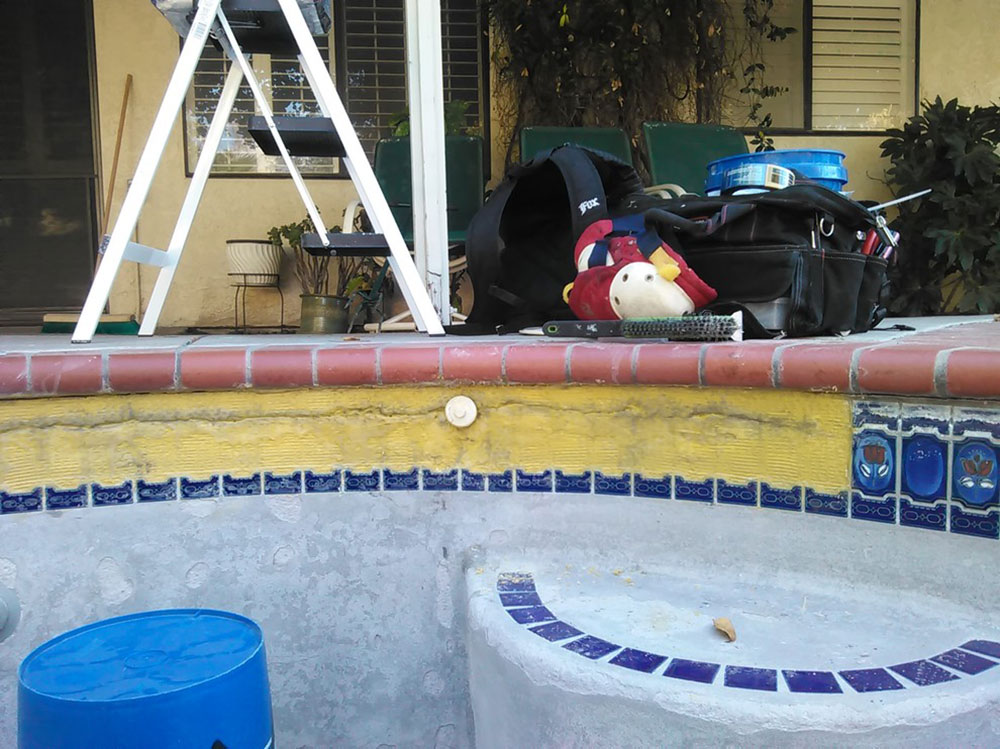 Image source: Lees Home Services
Image source: Lees Home Services
If you have decided to call in a qualified professional, make sure he has all the qualifications needed to complete your job. Your contractor may need to have a professional license in some cities. Call a qualified company directly rather than going through a marketing company. A marketing company will add a fee onto your overall price.
Ending thoughts on these pool leak detection methods
When you are going through a swimming pool detection process you will be aware that a leak can occur in any area of your pool. Your pool wall or lining, tiles, lighting or filtration system are all sources of possible pool leaks. Check that you do have a leak using a bucket test. If your water loss is more than the current rate of evaporation, it is time to check your filter system.
Once you know that this area is free from leaks, explore the body of your pool, using a dye test as a pool leak detection method. Once you have located your leak you can either fix it or ask for the help of a qualified professional. Good luck and happy swimming.
If you liked this article about pool leak detection methods, you should check out these as well:
- DIY pool: How to build a natural swimming pool
- Outdoor Pool Designs That You Would Wish They Were Around Your House
- Small pools: inground, fiberglass, backyard pool designs
- Pros And Cons Of Having A Swimming Pool In Your Yard
- Best 46 Indoor Swimming Pool Design Ideas For Your Home
- Pool maintenance tips and ideas
- Outside Swimming Pool Design And Landscaping Ideas
- How much value does a pool add to a home?
